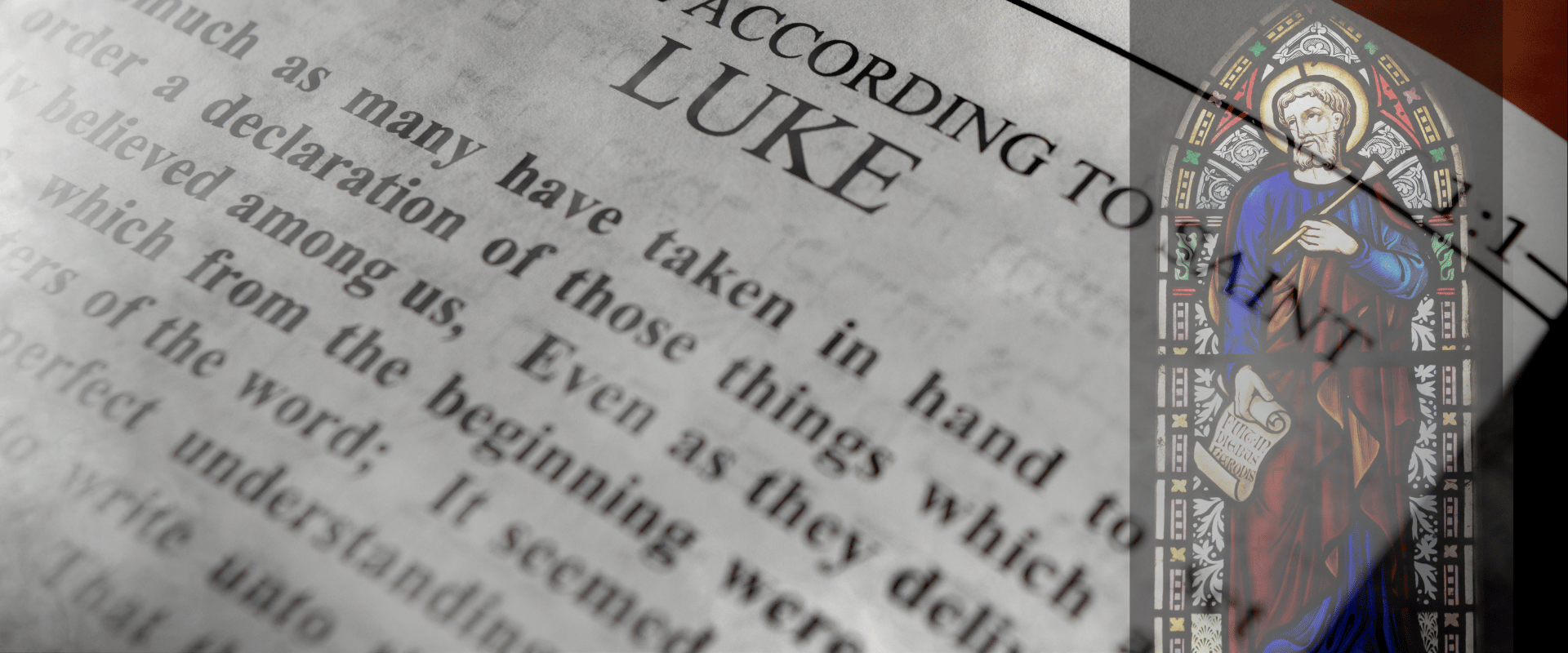Luke in the Bible: Life, Death & Interesting Facts

Written by Marko Marina, Ph.D.
Author | Historian
Author | Historian | BE Contributor
Verified! See our guidelines
Verified! See our editorial guidelines
Date written: October 19th, 2024
Edited by Laura Robinson, Ph.D.
Disclaimer: The views and opinions expressed in this article belong to the author and do not necessarily match my own. - Dr. Bart D. Ehrman
Suppose your travel plans eventually take you to the enchanting city of Bologna in Italy. In that case, one sight will surely catch your eye — the magnificent Basilica of San Luca, perched high above the city. This impressive structure, the largest church in the world dedicated to St. Luke, has been a cherished pilgrimage site for millions, including myself.
The basilica honoring Luke in the Bible is renowned for housing a revered icon of the Virgin Mary, which tradition claims was painted by St. Luke himself. However, though cherished by many, this attribution is more a matter of legend than historical fact.
And, as we all know, legends in Christian tradition come in all shapes and forms — sometimes as relics, sometimes as saints who can seemingly be everywhere at once, and sometimes as paintings done by apostles moonlighting as artists!
Luke’s name is not only tied to works of art but also to the very foundations of Christianity. His presence in the Bible, particularly in the New Testament, has intrigued scholars and believers alike for centuries. Who was Luke in the Bible?
He is traditionally known as the author of both the Gospel of Luke and the Acts of the Apostles — collectively called Luke-Acts — two major works that provide a theologically driven account of Jesus’ life and the early Christian movement.
But what can we know about Luke? Is he the same person referenced in Paul's letters, a physician and loyal companion? Or is the author of Luke-Acts someone else entirely?
This article will delve into the identity of Luke in the Bible, exploring the figure traditionally connected to the Gospel and Acts and what scholars think about this association.
We’ll first look at the person named Luke mentioned by Paul, unravel the traditional view that Luke wrote these important works, and then turn our attention to what we can know about the author of Luke-Acts.
By the end, we’ll see that, while the Church has long held that Luke the physician wrote these two works, modern scholarship tells a more complex and nuanced story!
However, before we begin, I want to invite you to check out an online course “The Unknown Gospels: Matthew, Mark, Luke, and John” by Dr. Bart D. Ehrman. In it, Dr. Ehrman provides a scholarly (historical) analysis of the documents that have shaped Christian history!

Who Was Luke in the Bible? A Brief Overview
Luke, the physician, is mentioned in three key passages within the New Testament, each attributed to the apostle Paul. However, only the Philemon reference is generally accepted among scholars as to be likely written by Paul himself.
#1 –The first reference comes from Colossians 4:14, where the author, who identifies himself as Paul, refers to “Luke, the beloved physician” and includes him among those sending greetings to the church in Colossae.
This brief but significant reference provides one of the few direct pieces of information about Luke’s profession and identity.
#2 – A second mention appears in 2 Timothy 4:11, where the author, again claiming to be Paul, urges Timothy to come to him quickly, lamenting that “only Luke is with me.”
#3 – Finally, in Philemon 24, Luke is listed among Paul’s "fellow workers" who send greetings to Philemon, a rich slave owner.
While it’s theoretically possible that these references could be describing more than one individual named Luke, the presence of another individual — Demas — mentioned in connection with Luke in each of these instances suggests otherwise.
Many scholars, based on this correlation, have concluded that these passages likely refer to the same Luke — a close companion of Paul during his later years. This assumption has generally become accepted within the scholarly community, as the same characters reappear in similar contexts across these letters.
From these brief mentions, what can we infer about Luke? The most direct insight comes from his identification as a "physician" in Colossians.
(Affiliate Disclaimer: We may earn commissions on products you purchase through this page at no additional cost to you. Thank you for supporting our site!)
As James D. G. Dunn notes in his Commentary on Colossians:
The present passage contains the only firm information about Luke, that, apart from being a close companion of Paul's (at least during his later imprisonment), and one of Paul's 'coworkers,' he was a doctor. This indicates a man of some learning and training... We may assume he was no charlatan but respected for genuine medical knowledge... Beyond that, we know nothing firm about Luke.
The story of the mysterious Luke could have ended there, with him as nothing more than Paul’s faithful companion. However, the early Church elevated Luke's importance considerably by attributing to him the authorship of two important New Testament books: the Gospel of Luke and the Acts of the Apostles.
St. Irenaeus, writing in the late second century, identifies Luke as the author of these works in his Against Heresies, where he describes Luke as a follower of Paul who carefully compiled the account of Jesus' life and the early Church.
Similarly, the Muratorian Canon, a late second-century document listing accepted Christian writings, explicitly attributes Luke-Acts to Luke, the physician.
Luke in the Bible: Assessing the Traditional Attribution
The Gospel of Luke contains no authorial attestation — the author never explicitly identifies himself within the text. In this sense, the Gospel is anonymous. It wasn’t until later, particularly in the later part of the second century, that the early Church began attributing the text to “Luke the Evangelist.”
With the emergence of other writings like the Gospel of Peter, the Church needed a way to distinguish between the various accounts of Jesus' life and ministry. This led to the attachment of the names Matthew, Mark, Luke, and John to the canonical Gospels.
Additionally, the title "Gospel according to Luke" appears in the oldest extant manuscript of the text (P75), although this manuscript dates to the early third century.
Bart D. Ehrman, in his book Jesus: Apocalyptic Prophet of the New Millennium, notes that the oldest manuscript titles reveal noticeable grammatical variations, suggesting that these titles were not fixed elements of the original texts but added later.
This reinforces the idea that the attribution to Luke in the Bible emerged well after the Gospel had circulated anonymously.
Another line of inquiry that casts doubt on Luke’s authorship of Luke-Acts comes from the inconsistencies between the undisputed letters of Paul and the account of Paul’s life in the Book of Acts. These inconsistencies suggest that the author of Acts may not have been a close companion of Paul.
One clear example is the discrepancy concerning Paul’s visits to Jerusalem after his conversion. According to Paul himself in Galatians 1:18, he went to Jerusalem three years after his conversion, staying for fifteen days to meet Peter and James. Later, he returned to Jerusalem again, fourteen years after the first visit (Galatians 2:1).
In contrast, Acts portrays Paul visiting Jerusalem shortly after his conversion and again before beginning his ministry. In his book The New Testament: A Historical Introduction Ehrman reminds us:
There is one way of determining whether the portrayal of Paul in Acts is accurate and fair: we can compare what Acts says about Paul with what Paul says about Paul. Unfortunately, when we do so, several significant differences emerge – both discrepancies of detail, such as where Paul was at certain times and with whom, and broader discrepancies in the actual teachings of Paul.
Despite these inconsistencies, why did the early Church attribute the authorship of both the Gospel of Luke and Acts to Luke, the companion of Paul? French scholar Daniel Marguerat provides a possible explanation:
Thus, the attribution of the authorship to 'Luke the physician’, a collaborator of Paul (Col 4:14; 2 Tim 4:11; Phm 24), is based on the following reasoning: according to 2 Tim 4:11, Luke is the last collaborator who remained faithful; now, this epistle, written according to the author's claims in Rome (2 Tim 1:17), fits precisely where the narrative of Acts ends (Acts 28:30-31). As a result, the connection between these two texts designates Luke as the author of Luke-Acts.
Did You Know?
St. Luke and the Medieval Legends
During the Middle Ages, pilgrimages to places believed to hold relics of important early Christian figures were incredibly popular. St. Luke was no exception! One of the most famous relics attributed to him is his body, which is revered in the Basilica di Santa Giustina in Padua, Italy.
According to tradition, his remains were transferred from Thebes to Constantinople in the 4th century and then moved to Padua, where pilgrims flocked to venerate them.
But that’s not all — another relic believed to be St. Luke’s skull is kept at St. Vitus Cathedral in Prague. The skull was a gift to Emperor Charles IV from the Patriarch of Constantinople in 1354 and became a significant draw for medieval pilgrims as well. Although most historians deny their historical authenticity, these relics certainly illustrate St. Luke’s lasting influence during the Middle Ages and beyond!
Nevertheless, it’s important to note that not all scholars dismiss the traditional view. Some, such as Joseph A. Fitzmyer, argue that Luke the Evangelist could, indeed, have been an occasional companion of Paul and the author of both the Gospel and Acts.
While I accept the opinion of the majority of scholars who view this attribution with skepticism, for the sake of continuity and tradition, I will continue to refer to the author of Luke-Acts as Luke. Now, let’s turn to what we can learn about this figure — whether Luke (the companion of Paul) or another — through the texts he left behind.
FREE COURSE!
WHY I AM NOT A CHRISTIAN
Raw, honest, and enlightening. Bart's story of why he deconverted from the Christian faith.
Over 6,000 enrolled!
Luke the Evangelist: What Can We Know?
One of the first questions to ask when exploring the Gospel of Luke is: “Did Luke know Jesus?” The answer, based on the evidence we have, is no.
Luke wrote his Gospel 50 to 65 years after Jesus' death, making it highly unlikely that he had any personal connection to Jesus. This is made clear in the prologue to his Gospel, where Luke himself notes that he is relying on the accounts of others. As he writes:
Many have undertaken to draw up an account of the things that have been fulfilled among us, just as they were handed down to us by those who from the first were eyewitnesses and servants of the word. With this in mind, since I myself have carefully investigated everything from the beginning, I too decided to write an orderly account for you, most excellent Theophilus, so that you may know the certainty of the things you have been taught.
As Michael Wolter notes in his Commentary, Luke here follows a common historiographical convention from the Hellenistic-Roman period, in which authors prefaced their works with a statement on the subject and methods used.
However, this introduction also signals that Luke was compiling information that was already circulating, mostly second or even third-hand sources.
While Luke relied on oral traditions, we also know that he drew from earlier written works, such as the Gospel of Mark and a hypothetical source known as “Q,” which scholars believe was a collection of sayings of Jesus that both Matthew and Luke utilized.
As for where Luke was born, we know very little. In fact, we have almost no solid information about Luke’s early life or birthplace. Some early Church traditions speculate that he was a Gentile from Antioch in Syria, but there is no concrete historical evidence to support this claim.
One thing we do know is that Luke was an incredibly skilled and educated writer, as demonstrated in both his Gospel and the Acts of the Apostles. Contemporary scholars, such as Karl A. Kuhn in his book Luke: The Elite Evangelist, highlight Luke’s literary mastery, especially his command of Greek.
Luke’s ability to switch between different styles of Greek — ranging from the elevated style of the prologue to the more vernacular language of his narrative — shows his versatility and sophistication.
Furthermore, Kuhn points out that Luke employed numerous literary devices, such as parallelism, step-parallelism, and travel accounts, that are commonly found in ancient Greco-Roman historiography.
Another question that arises when exploring Luke’s life is: “How did Luke die?” Unfortunately, like much of Luke’s biography, we simply don’t know. Early Church tradition, recorded by Eusebius, claims that Luke lived to the age of 84 and died in Boeotia, Greece.
Some legends even suggest he was martyred, though these stories lack any historical evidence. From a scholarly perspective, it's difficult to determine how reliable these accounts are, and we must acknowledge that we have no verifiable information about his death.
So, what can we know about Luke in the Bible? While we cannot be sure of where he was born or how he died, what remains clear is that Luke was a highly educated and talented writer who played a significant role in shaping the early Christian narrative.
Moreover, he could have been a Gentile who converted to Christianity or a Jewish convert (even though these identity distinctions were quite blurred during that period!). His knowledge of both the Septuagint and Greco-Roman literary styles could point in either of these two directions and scholars are divided — an issue I explored in an earlier article!
Finally, whether he was a close companion of Paul, as some traditions hold, or simply a highly skilled historian who gathered information from multiple sources and edited them to suit the needs of his community and theology, Luke's contribution to the Christian canon is undeniable.

Conclusion
In conclusion, while much about Luke remains uncertain, his impact on the Christian tradition is indisputable. Luke in the Bible stands as a key figure, not only through his association with Paul but also as the author of the Gospel of Luke and Acts, two foundational texts in the New Testament.
Despite the ongoing scholarly debate about whether Luke the Physician and Luke the Evangelist are the same person, what is clear is that Luke’s writing reflects a high degree of literary and theological sophistication.
Through his skillful use of Greek, his reliance on earlier sources, and his mastery of ancient historiographical conventions, Luke shaped the narrative of early Christianity in profound ways.
FREE COURSE!
WHY I AM NOT A CHRISTIAN
Raw, honest, and enlightening. Bart's story of why he deconverted from the Christian faith.
Over 6,000 enrolled!
